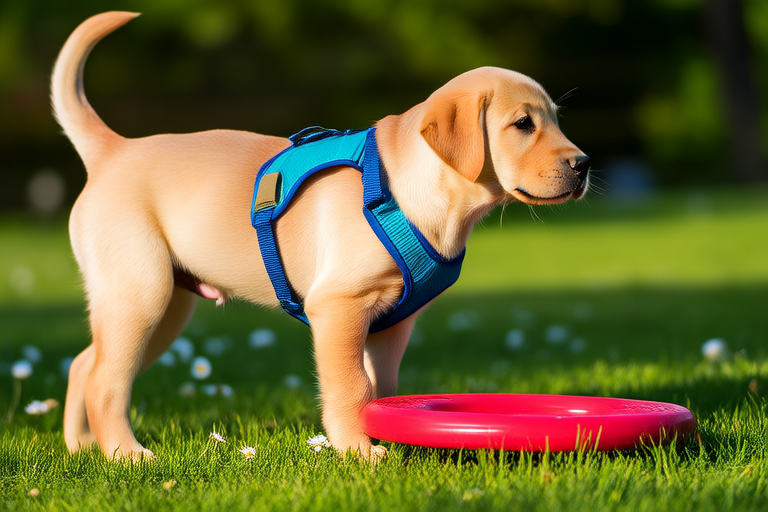Comprehensive Guide to Training an Energetic Labrador Puppy
Welcome to this comprehensive guide on training your energetic Labrador puppy. Labrador Retrievers are known for their boundless energy and friendly nature, making them great companions but also requiring dedicated training efforts. This guide will cover everything from basic obedience training to managing high energy levels and addressing common behavioral issues.
Basic Obedience Training
Teaching your Labrador puppy basic commands is crucial for establishing control and communication. Start with simple commands like ‘sit’, ‘stay’, ‘come’, and ‘leave it’. Use positive reinforcement by rewarding good behavior with treats or praise. For example, when teaching ‘sit’, hold a treat above the puppy’s nose and slowly move it back, encouraging the puppy to lower its bottom. As soon as they sit, give them the treat and say ‘good sit’.
Consistency is key in obedience training. Always use the same command word and reward system. If your puppy doesn’t follow a command, don’t get frustrated. Instead, gently guide them into the correct position and repeat the command. Remember that puppies learn through repetition and positive experiences.
Managing High Energy Levels
Labrador puppies have a lot of energy that needs to be channeled appropriately. Regular exercise is vital to keep them healthy and happy. Aim for at least two hours of physical activity daily, including walks, playtime, and interactive games. Incorporate activities that challenge both their mind and body, such as fetch or puzzle toys.
Provide mental stimulation through training sessions, agility courses, or scent work. Rotate toys to prevent boredom and encourage independent play. Create a routine that includes designated playtimes and quiet periods. Establishing a predictable schedule helps your puppy understand expectations and reduces anxiety.
Potty Training
Potty training requires patience and consistency. Choose a specific area outside for bathroom breaks and take your puppy there frequently, especially after meals, naps, and playtime. Use a consistent command like ‘go potty’ while they’re eliminating. Praise and reward them immediately after they finish.
If accidents happen inside, clean the area thoroughly with an enzymatic cleaner to remove odors. Avoid punishing your puppy, as this can create fear and stress. Instead, redirect them to the appropriate outdoor area. Crate training can be helpful during the potty training process. A properly sized crate provides a safe space for your puppy and discourages inappropriate elimination indoors.
Socialization Techniques
Early socialization is essential for raising a well-adjusted Labrador. Expose your puppy to various environments, people, animals, and situations. Take them to different parks, pet stores, and dog-friendly cafes. Encourage interactions with other dogs and familiarize them with household noises and appliances.
During socialization, focus on positive experiences. Offer treats and praise when your puppy approaches new stimuli calmly. If they show signs of fear or discomfort, provide reassurance and gradually introduce them to the situation. Socialization should continue throughout your puppy’s development, ensuring they remain confident and adaptable.
Exercise Routines
A structured exercise routine keeps your Labrador physically fit and mentally stimulated. Start with short, frequent walks, gradually increasing duration and intensity as your puppy grows. Incorporate activities that challenge their natural instincts, such as swimming or retrieving games.
Consider enrolling your puppy in agility classes or joining a local dog club for organized activities. Swimming is particularly beneficial for Labradors, as it provides full-body exercise and mental stimulation. Ensure your puppy has access to water and shade during outdoor activities to prevent overheating.
Common Behavioral Issues
Barking, chewing, and jumping are common behaviors in young puppies. Address these issues through positive reinforcement and redirection. Teach your puppy that barking for attention leads to silence and treats. Redirect chewing by providing appropriate chew toys and praising them when they use them.
To discourage jumping, ask your puppy to sit before petting or greeting you. Reward them for sitting calmly. Consistency and patience are key in addressing behavioral issues. Seek professional help if problems persist or worsen.
Positive Reinforcement Methods
Positive reinforcement is a proven method for effective training. It involves rewarding desired behaviors with treats, praise, or affection. This encourages your puppy to repeat those behaviors in the future. Always use treats your puppy loves and vary the rewards to maintain interest.
Timing is crucial in positive reinforcement. Reward your puppy immediately after the desired behavior occurs. This helps them associate the reward with the action. Gradually reduce the frequency of treats as your puppy learns and replaces them with verbal praise or petting.
Real-Life Examples
Imagine you’re teaching your Labrador puppy to come when called. You start by calling their name and offering a treat. Once they approach, you give them the treat and say ‘good come’. Over time, you decrease the number of treats and increase verbal praise. Eventually, your puppy comes when called without needing a treat.
Another example is addressing chewing. You catch your puppy chewing on a shoe. Instead of scolding, you offer a chew toy and praise them when they start chewing on it. By redirecting their behavior, you teach them what is acceptable to chew on.
Conclusion
Training an energetic Labrador puppy requires dedication, patience, and positive reinforcement. By following this comprehensive guide, you’ll establish a strong bond with your puppy and set them up for success. Remember that every puppy is unique, so adapt your training methods to suit their individual needs and personality. With consistent effort and love, you’ll have a well-behaved and happy companion.
